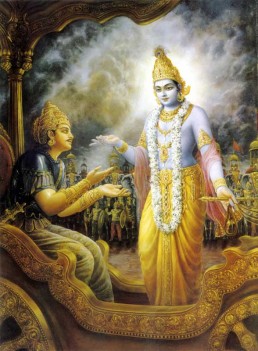SATTWIC MEN WORSHIP DEVAS — Every man in life brings his entire devotion and offers it at one altar or another, and seeks fulfilment from the benefits that accrue from the invocations. In scriptural language this is called WORSHIP. This need not indicate only the ritualistic worship of some God or deity. The term WORSHIP here embraces a wider implication. Every one of us is a WORSHIPPER at some altar chosen by him; even atheists are worshippers… perhaps they devote themselves to the alter of sense-objects, or of wealth, or of power. In this ampler meaning, if we are to read the stanza, the meaning becomes very clear indeed. Men of Sattwic temperament, because of their serene composure and tranquil disposition, seek their fulfilment at an altar of divinity indicating the Higher impulses and the nobler qualities of their being. Naturally, they seek and come to adore such a divine Godly altar.
YAKSHAS AND RAKSHASAS BY THE RAJASIC — Men of ‘passionate nature’ (Rajas) are those who have extreme ambition and are constantly restless in their self-chosen fields of activity. They are said to be worshipping and pro-pitiating demi-gods (Yakshas and Rakshasas). The idea here is that the choice of the altar will depend upon the silent demands of the heart of the devotee. One will never go to a bookstall to purchase some dress. So too, the active and the passionate type of men can feel an admiration for, and can appreciate, only an equally active and passionate (Rajasic) demi-god or deity.
THE TAMASIC MEN (WORSHIP) THE PRETAS AND BHUTAS — The dead ‘spirits’ and such other low and vicious powers are invoked by the men of ‘inactivity’ (Tamas) for the satisfaction of some of their low urges for vicious sense-gratifications. Men of low moral calibre and false education, generally, would try to fulfil their pernicious ambitions with the help of the wretched vengeful scum of the society (Pretas, Bhutas), who, though physically alive, are dead to all sweetness and goodness in life. These hired goondas (thugs), generally chosen from professional jail-birds, are the fit powers to be invoked in order that low and criminal ambitions of the Tamasic can be fulfilled.
The same import has been brought out in many earlier stanzas (VII-20 to 23; IX-23 to 25). The modern man would be rather curious to know whether there really exist such powers and deities as pretas and bhutas. It is in fact immaterial for the purpose of studying this portion of the Geeta whether such powers REALLY exist or not. They are indicative of certain types of powers which are available in this world of ours.
“The help gained from good friends,” the “protection invoked from the rich and the powerful,” and the “enormous strength gathered from the low thoughtless men of criminal intentions” — these are the different types of ‘altars’ at which men of serenity (Sattwic), of ambition (Rajasic), of heedlessness (Tamasic), generally seek their individual satisfaction. From the nature of a man’s field-of-activity, we can, to a large extent, understand to what type he belongs.
THAT THE SPIRIT OF DEVOTION IN MEN, EVER REMAINING THE SAME, EACH WILL SELECT ACCORDING TO THE TYPE OF HIS ‘SHRADDHAA,’ HIS OWN ALTAR OF DEVOTION, HAS BEEN SHOWN IN THE ABOVE. THE WRONG WAY OF STRIVING IS PAINTED BELOW:

